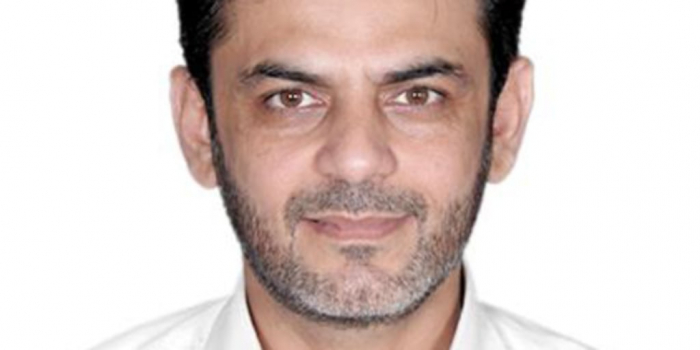A Pakistani man suspected of plotting on behalf of Iran to kill high-ranking U.S. politicians or officials — including perhaps former President Donald Trump — is in U.S. custody after being charged with trying to hire hit men to carry out the plot, according to U.S. officials and court documents.
Asif Merchant, 46, was arrested in Texas on July 12 as he prepared to leave the country, prosecutors said.
The Sloan Masters in Leadership & Strategy. In a class of it's own.
Sponsored By London Business SchoolWhen you're the one everyone turns to, who do you turn to?
U.S. officials said Tuesday that the plot was not connected to the assassination attempt on Trump at a rally in Butler County, Pennsylvania, on the day following Merchant’s arrest. Rather, officials said, the plot appears to be related to efforts by Iran to retaliate for the killing of Iranian General Qasem Soleimani in a U.S. drone strike Trump ordered in Iraq in 2020.
The Sloan Masters in Leadership & Strategy. In a class of it's own.
Sponsored By London Business SchoolWhen you're at the top, where do you go?
Court filings released as the case became public Tuesday refer to the potential target in elliptical terms as a U.S. politician or public official, with no specific mention of Trump. But in discussions Merchant had with others, Trump’s name came up as a possible target, according to a law enforcement official granted anonymity to discuss sensitive details about the investigation.
A former senior Trump administration official said Tuesday he received a “duty to warn” briefing from the FBI about Merchant before the indictment was unsealed.
Among the indications that Merchant was targeting a high-level official is a comment he allegedly made about the target being well protected.
On June 4, during a sting operation mounted by the FBI, Merchant told a confidential source that there would be security “all around” the target, FBI Special Agent Anthony Cipriano said in an affidavit filed in federal court in Brooklyn, New York.
Merchant appeared in federal court there on July 17 and a magistrate judge ordered him held without bail, according to court records. In an unusual move, the criminal complaint and a letter from prosecutors urging Merchant’s detention were kept secret until Tuesday at the government’s request.
During a visit to prosecutors and law enforcement agents in Iowa Tuesday, Attorney General Merrick Garland decried the alleged plot, but stressed that investigators do not see a connection to the assassination attempt on Trump in Pennsylvania. Officials believe that shooting was carried out by Thomas Matthew Crooks, a 20-year-old American from Bethel Park, Pennsylvania, who was shot dead at the scene by a Secret Service sniper.
“I do want to recognize that in the wake of the attempted assassination of former President Trump last month, the American people are more aware than ever about the seriousness of the threats facing our public officials,” Garland said. “While our investigation into the attempted assassination remains ongoing, as the FBI has stated multiple times, we have not found any evidence that the shooter had accomplices or co-conspirators, either foreign or domestic.”
According to court papers, the FBI became aware of Merchant’s plot in April after he traveled in Iran and Pakistan before flying to the U.S. and reaching out to someone who reported to law enforcement that Merchant had asked him to help steal information, organize protests and carry out an assassination. That unnamed contact agreed to become a confidential source for the FBI, court filings say.
The FBI arranged a pair of undercover officers to pose as hit men who could help with the operation, according to prosecutors. He met them in June and told them he was looking to kill a “political person,” Cipriano wrote.
In a later meeting with the confidential source, Merchant provided a rudimentary written code that would obscure the purpose of their interactions, court filings say.
“Merchant wrote that the word ‘tee-shirt’ would mean a ‘protest,’ which he described as the ‘lightest work,’” Cipriano wrote. “The phrase ‘flannel shirt’ would mean ‘stealing,’ which was ‘heavier work.’”
“Fleece jacket,” Cipriano continued, was Merchant’s code for murder.
When Merchant was arrested, agents found a list of the codewords in his wallet, Cipriano said.
The court filings don’t say Merchant explicitly declared that he was acting on behalf of Iran, but say he “indicated an affinity for Iran,” often traveled there, and had a wife and children both in Iran and Pakistan.
Threats from Iran have led the Secret Service to increase security for Trump and other current and former U.S. officials in recent months. That increase was prompted in part by the plot Merchant is charged with, a law enforcement official said Tuesday.
“Certainly, that was part of the calculus,” said the official, who was granted anonymity to discuss the security arrangements.
Secret Service spokesperson Anthony Guglielmi said officials are aware of the Iranian threat and are taking it into account when planning security arrangements.
Some in Congress have pressed for even more security coverage in response to the threats U.S. officials have attributed to Iran.
During a Senate hearing last week about the Pennsylvania assassination attempt on Trump and federal agencies’ handling of it, Sen. Tom Cotton (R-Ark.) pressed acting Secret Service Director Ronald Rowe about the cancellation of a security detail for former national security adviser Robert O’Brien.
“Who made that decision despite Iran’s ongoing, credible threats?” Cotton asked, urging that the protection be restored.
“It wasn’t the Secret Service,” Rowe said, adding that such protection was usually granted by presidential memorandum.
“I’m pretty confident that the agency can get this done, and I think it needs to get done, if you look at the kind of ongoing threats that he and all these others face,” Cotton said.
Politico
More about:
















































